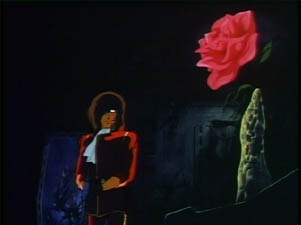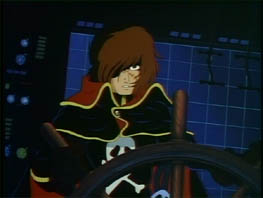|
I love this movie. It damn well nearly makes me fucking cry every time I see it, and I hate Japanese cartoons as a general rule. This rule used to be different, because at one time they made movies like this. Nowadays, if you browse through the anime section at a video store, you're greeted with an endless parade of identical-looking kiddie shows featuring guys with colored knives for hair and insipid girls in skimpy sailor suits, wearing expressions that suggest that they've breakfasted on Kellog's sugar-frosted Ecstasy. The difference between those cartoons and this is wider than night and day; it's the difference between a lusterous night on Earth and daytime on the moon, where all is barren, flat, and boring. 
Sometime in the early twentieth century, aerial explorer Phantom F. Harlock attempts to cross the Owen-Stanley mountain range in New Guinea, only to find that his simple biplane cannot manage to reach the altitude necessary to crest the highest peak. Turning back in defeat, he seems to hear the mountain laughing at him, and turns around for a second attempt, jettisoning all but ten minutes' worth of fuel to lighten the plane. Trusting his life to his beloved aircraft, named Arcadia, he challenges the mountain head-on, believing that true defeat only comes from surrender. A thousand years later his descendant, the Solar Federation Captain Harlock, closes the book on his ancestor's tales of adventure before we can hear how the second attempt fared, and we join the story as Harlock's ship, bearing refugees from an conquered Earth, is attacked and forced back home again. The occupying army, the alien Illumidas, offers Harlock work, but he refuses to collaborate, and is turned out into the streets with the rest of humanity, where food and hope are both in short supply. Over the course of the next two hours, he'll meet a growing cast of potential allies, all yearning for something greater, all the while haunted by the whispered Voice of Free Arcadia, a pirate radio transmission that implores the defeated populace not to lose hope, and whose messages often seem directed at all too specific an individual. It would almost be disingenuous to call this a science-fiction film, despite the presence of spaceships and some wholly fictional science. It's first and foremost an art film set in the aftermath of conflict, a meditation on what makes a true man. With nods to previous high-reaching wartime films such as Renoir's Grand Illusion and Kubrick's Paths of Glory, Arcadia presents the notion, common to most of story-writer Leiji Matsumoto's SF work, that what makes a man worthy of respect is a matter of his ethics, not what side of the conflict he happens to be on. In a lengthy flashback to World War II, we meet Phantom F. Harlock II, a Luftwaffe pilot who describes his work as a soldier as being a means of paying his rent. He's a deadly foe in the air, but Harlock is no mindless Nazi stooge; he's seen as a man who openly disdains the conflict he's been forced into, a man with a detached sentimentality for the simple life left behind at home, a man who feels his strongest kinship with his plane's gunsight, the "eye" that has never failed him. He finds a kindred spirit in the Japanese technician Tochiro Oyama, who wishes for an end to the war so that he might fulfill his desire to work on a hoped-for trip to the moon, a "project with a future." Separated from Harlock by circumstance, he vows that their friendship will never be forgotten, and a thousand years later, his descendant meets the ex-Solar Federation Captain Harlock and picks up the past alliance where it left off: a former Federation mechanic himself, he's built the ultimate spacecraft, with which they can escape the occupied Earth and begin fighting back. 
The recurrent theme in Arcadia is one of a cyclical nature to the world, much aligned with the Buddhist notion of reincarnation, wherein events repeat and the same battles are fought until they are finally won. Harlock's attempt at saving the citizens of the previously-conquered planet Tokarga, also defeated by the Illumidas, forces him into a repeat of his ancestor's battle with the Owen-Stanley mountains and its laughing, spectral witch, a battle won only by means of a tragic sacrifice. The message is clear enough: there is no end-all, be-all victory in the course of life. The struggle never ends, but only by keeping up the good fight can there be any hope. The struggle brings pain, but pain, as the closing song reminds us, is proof that we still live. The film is undisputably a tragedy, yet not one with a nihilistic vacuum of despair at its core; it's melacholic, but never angsty, decrying self pity in favor of self-worth and ability. People are fond of extolling the virtues of the human spirit and its capacity to overcome terrible odds, but My Youth in Arcadia is swift to remind one that the person who survives to tell of all those struggles and victories might not be you in the end; the film, and Harlock stories in general, is filled with fallen heroes of all sorts. As the Illumidas occupation leader Zeda closes quarters with Harlock's battleship Arcadia for the last time, he respectfully tells his opponent, "When we meet in Hell, let's drink as friends." Beneath its trappings of sci-fi and pirates, the film has a deeper meaning, one about decent men remaining decent in terrible times, about a loyalty to friends and one's own sense of honor that trumps any superficial nationalistic allegiances. If that seems too stoic and high-minded for our cynical, ironic hipster culture to take seriously, perhaps it's our cynical, ironic hipster culture that should get the blame. -review by Matt Murray
|
|
||||||||